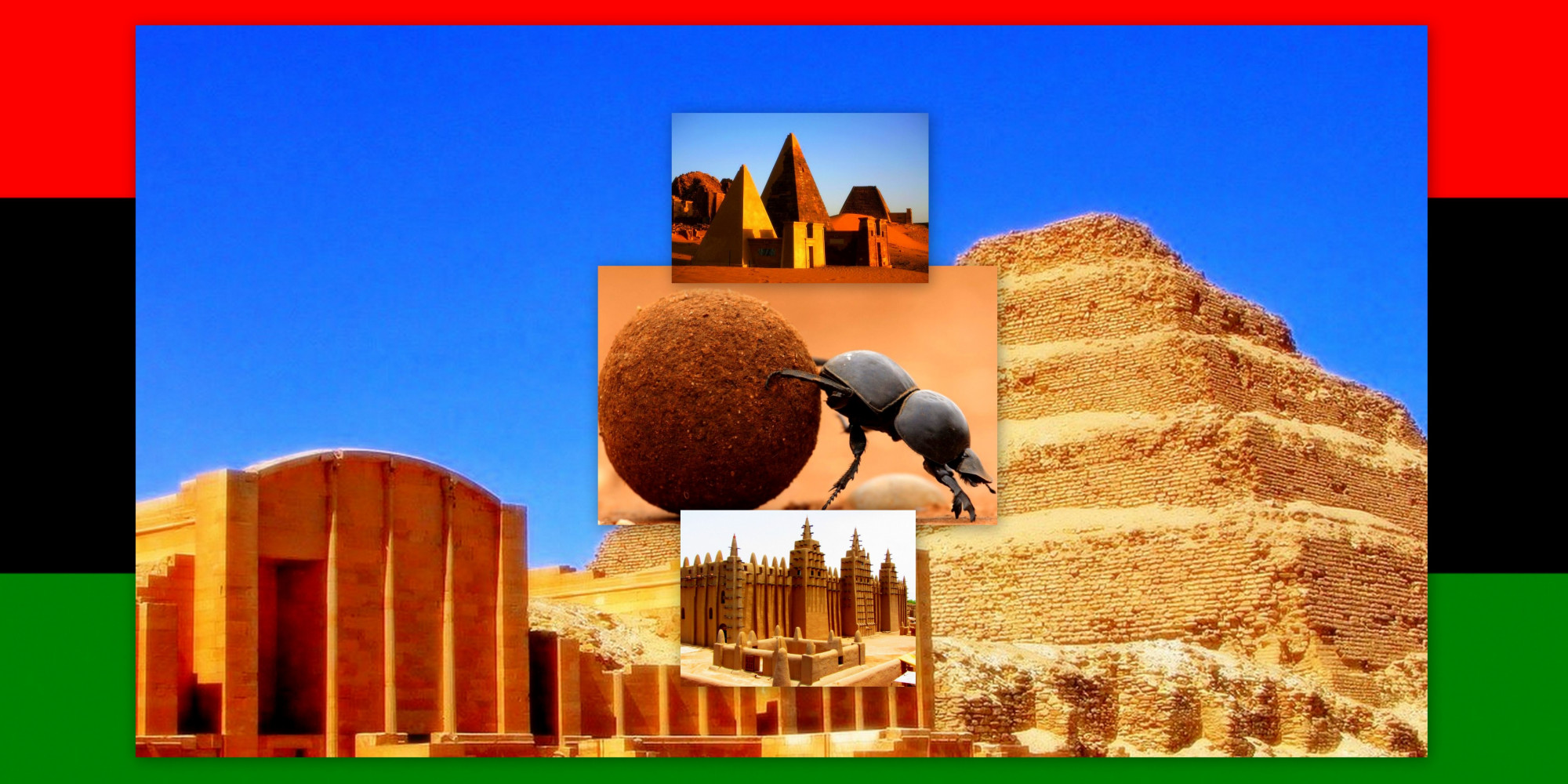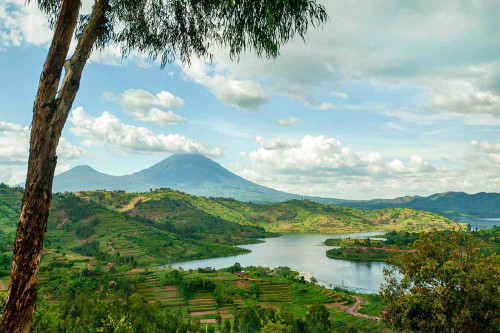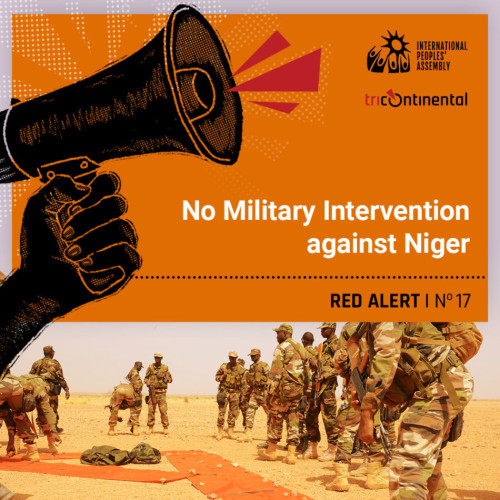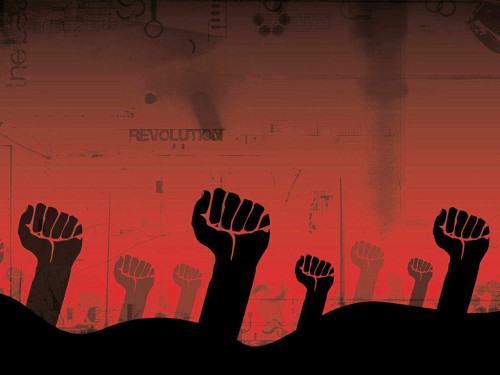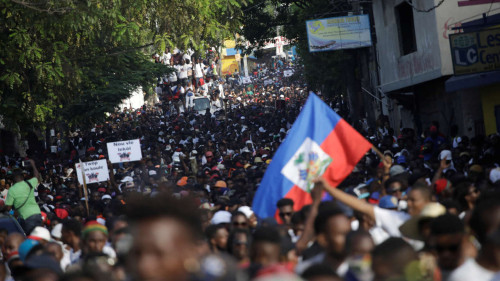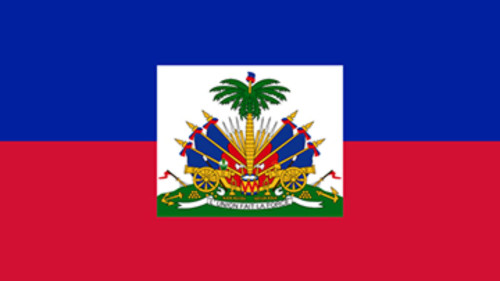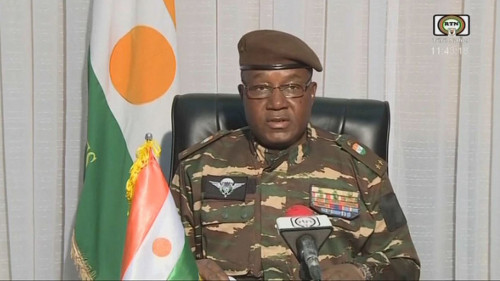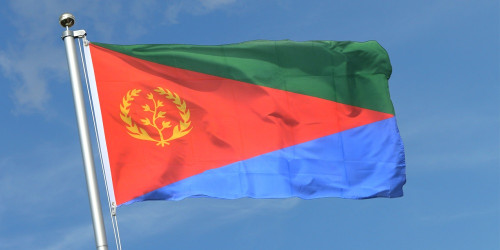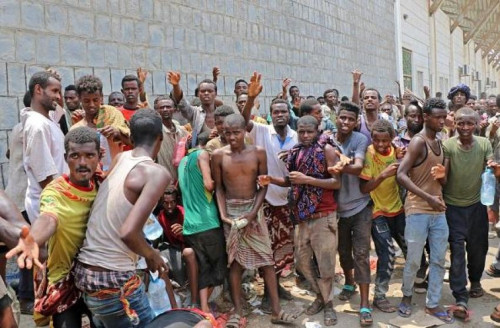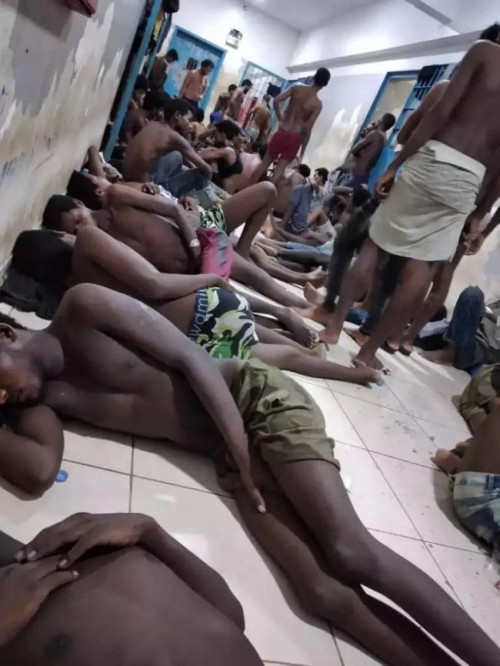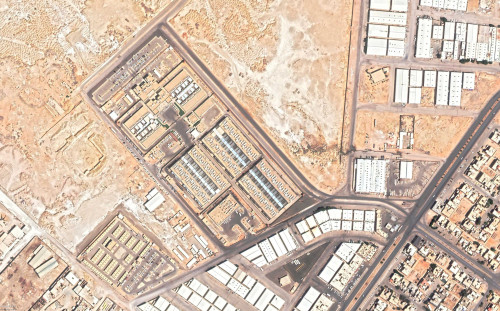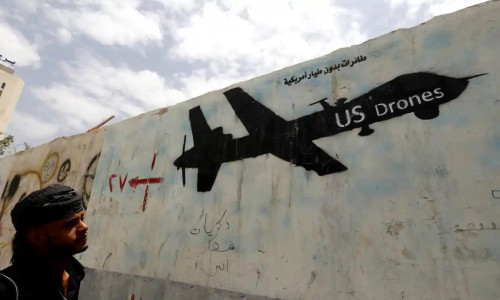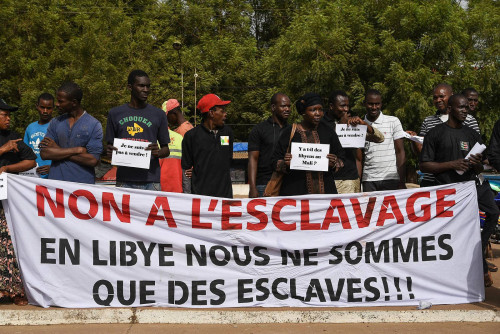The Global Pan-Afrikan News Bureau, part of Public Affairs Division of the University of New Timbuktu System (UNTS), generates and coordinates domestic and international news coverage of the Global Afrikans. Covering Global Pan-Afrikan news from Haiti, Cuba and the rest of the Caribbean, to West Papua, Fiji and the islands of Melanesia, from XraHA (Cairo) to the Cape and all lands in between, from the Fula, Wolof, Mandinka, Serer, Soninke, etc. of Senegal to the Dravidian peoples of South India, Pakistan, Afghanistan, Bangladesh, the Maldives, Nepal, Bhutan, Sri Lanka, Singapore, Malaysia, Myanmar, the Caribbean, and the United Arab Emirates (UAE).
“I often use that phrase that you hear all the time, things change to remain the same. So often you create apparent change to keep situations the same. The European learned of course that they didn’t have to maintain a direct military presence, say on the Afrikan continent or in other areas where Afrikans live in order to umm… protect their political and economic interests. So, … you create a ruling class… an indigenous ruling class there, you see and there appears to be change and it is a change of a sort, however, the basic economic dominance does not change at all.
I often talk about what I call the constants you see in our relationships with Europeans and it’s important that we look at the constants not the superficial changes you see. And often what happens is that first the European makes superficial the Afrikan intellect and makes superficial the Afrikan intelligence so that the Afrikan can be deceived by superficial changes while the basic and fundamental relationship are not changed at all. Down at the Institute of Technology I was talking to my students the other day, ‘Now your electrical engineers, but your fundamental relationship between… your fundamental relationship to Whites is no different from your grandparents who were in slavery, because that fundamental relationship is one of producing profits for your European masters.’
And so, if at some point making Blacks engineers, letting them be engineers or letting them be computer technologists or EVEN LETTING THEM BE PRESIDENT OF THE UNITED STATES will maintain that constant relationship that change will occur. And so often people then will respond to that apparent change and miss the fact that the FUNDAMENTAL RELATIONSHIP HAS NOT CHANGED AT ALL.”
Dr. Amos N. Wilson, WLIB Radio Interview, February | 1988
Over July and August Rwandan soldiers were deployed in Mozambique, purportedly to fight ISIS terrorists. However, behind this campaign is French maneuvering that benefits an energy giant eager to exploit natural gas resources, and perhaps, some backroom deals over history
September 09, 2021 by Vijay Prashad
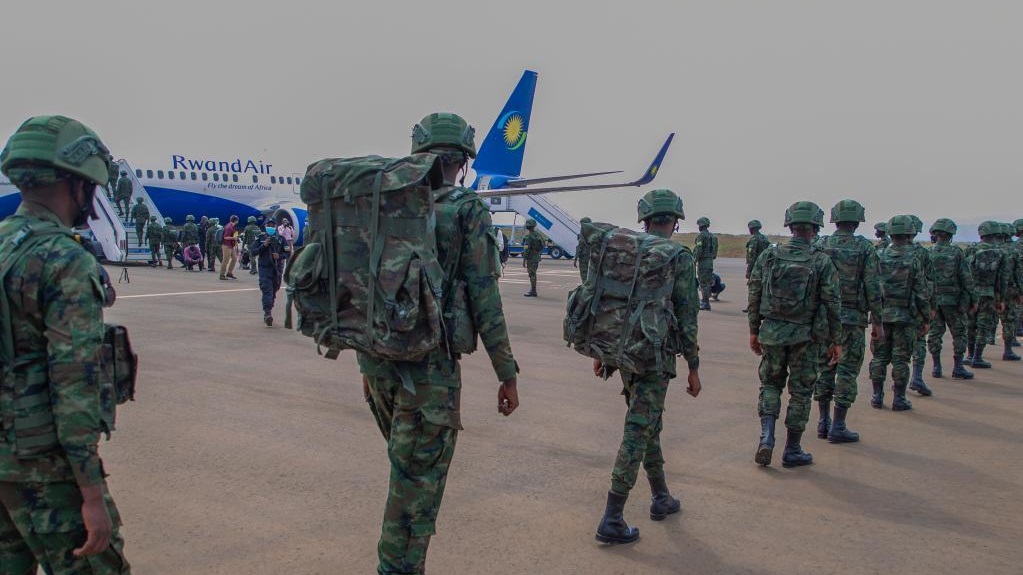
Rwandan soldiers board a plane to Mozambique in July. Photo: Cyril Ndegeya/Xinhua
On July 9, the government of Rwanda said that it had deployed 1,000 troops to Mozambique to battle al-Shabaab fighters, who had seized the northern province of Cabo Delgado. A month later, on August 8, Rwandan troops captured the port city of Mocímboa da Praia, where just off the coast sits a massive natural gas concession held by the French energy company TotalEnergies SE and the U.S. energy company ExxonMobil. These new developments in the region led to the African Development Bank’s President M. Akinwumi Adesina announcing on August 27 that TotalEnergies SE will restart the Cabo Delgado liquefied natural gas project by the end of 2022.
Militants from al-Shabaab (or ISIS-Mozambique, as the US State Department prefers to call it) did not fight to the last man; they disappeared across the border into Tanzania or into their villages in the hinterland. The energy companies will, meanwhile, soon start to recoup their investments and profit handsomely, thanks in large part to the Rwandan military intervention.
Why did Rwanda intervene in Mozambique in July 2021 to defend, essentially, two major energy companies? The answer lies in a very peculiar set of events that took place in the months before the troops left Kigali, the capital city of Rwanda.
Billions stuck underwater
Al-Shabaab fighters first made their appearance in Cabo Delgado in October 2017. For three years, the group played a cat-and-mouse game with Mozambique’s army before taking control of Mocímboa da Praia in August 2020. At no point did it seem possible for Mozambique’s army to thwart al-Shabaab and allow TotalEnergies SE and ExxonMobil to restart operations in the Rovuma Basin, off the coast of northern Mozambique, where a massive natural gas field was discovered in February 2010.
The Mozambican Ministry of Interior had hired a range of mercenaries such as Dyck Advisory Group (South Africa), Frontier Services Group (Hong Kong), and the Wagner Group (Russia). In late August 2020, TotalEnergies SE and the government of Mozambique signed an agreement to create a joint security force to defend the company’s investments against al-Shabaab. None of these armed groups succeeded. The investments were stuck underwater.
At this point, Mozambique’s President Filipe Nyusi indicated, as I was told by a source in Maputo, that TotalEnergies SE might ask the French government to send a detachment to assist in securing the area. This discussion went on into 2021. On January 18, 2021, French Defense Minister Florence Parly and her counterpart in Portugal, João Gomes Cravinho, talked on the phone, during which—it is suggested in Maputo—they discussed the possibility of a Western intervention in Cabo Delgado. On that day, TotalEnergies SE CEO Patrick Pouyanné met with President Nyusi and his ministers of defense (Jaime Bessa Neto) and interior (Amade Miquidade) to discuss the joint “action plan to strengthen security of the area.” Nothing came of it. The French government was not interested in a direct intervention.
A senior official in Maputo told me that it is strongly believed in Mozambique that French President Emmanuel Macron suggested the Rwandan force, rather than French forces, be deployed to secure Cabo Delgado. Indeed, Rwanda’s armies—highly trained, well-armed by the Western countries, and given impunity to act outside the bounds of international law—have proved their mettle in the interventions carried out in South Sudan and the Central African Republic.
What Kagame got for the intervention
Paul Kagame has ruled Rwanda since 1994, first as vice-president and minister of defense and then since 2000 as the president. Under Kagame, democratic norms have been flouted within the country, while Rwandan troops have operated ruthlessly in the Democratic Republic of the Congo. A 2010 UN Mapping Project report on serious human rights violations in the Democratic Republic of the Congo showed that the Rwandan troops killed “hundreds of thousands if not millions” of Congolese civilians and Rwandan refugees between 1993 and 2003. Kagame rejected the UN report, suggesting that this “double genocide” theory denied the Rwandan genocide of 1994. He has wanted the French to accept responsibility for the genocide of 1994 and has hoped that the international community will ignore the massacres in the eastern Congo.
On March 26, 2021, historian Vincent Duclert submitted a 992-page report on France’s role in the Rwandan genocide. The report makes it clear that France should accept—as Médecins Sans Frontières put it—“overwhelming responsibility” for the genocide. But the report does not say that the French state was complicit in the violence. Duclert traveled to Kigali on April 9 to deliver the report in person to Kagame, who said that the report’s publication “marks an important step toward a common understanding of what took place.”
On April 19, the Rwandan government released a report that it had commissioned from the U.S. law firm Levy Firestone Muse. This report’s title says it all: “A Foreseeable Genocide: The Role of the French Government in Connection with the Genocide Against the Tutsi in Rwanda.” The French did not deny the strong words in this document, which argues that France armed the génocidaires and then hastened to protect them from international scrutiny. Macron, who has been loath to accept France’s brutality in the Algerian liberation war, did not dispute Kagame’s version of history. This was a price he was willing to pay.
What France wants
On April 28, 2021, Mozambique’s President Nyusi visited Kagame in Rwanda. Nyusi told Mozambique’s news broadcasters that he had come to learn about Rwanda’s interventions in the Central African Republic and to ascertain Rwanda’s willingness to assist Mozambique in Cabo Delgado.
On May 18, Macron hosted a summit in Paris, “seeking to boost financing in Africa amid the COVID-19 pandemic,” which was attended by several heads of government, including Kagame and Nyusi, the president of the African Union (Moussa Faki Mahamat), the president of the African Development Bank (Akinwumi Adesina), the president of the West African Development Bank (Serge Ekué), and the managing director of the International Monetary Fund (Kristalina Georgieva). Exit from “financial asphyxiation” was at the top of the agenda, although in private meetings there were discussions about Rwandan intervention in Mozambique.
A week later, Macron left for a visit to Rwanda and South Africa, spending two days (May 26 and 27) in Kigali. He repeated the broad findings of the Duclert report, brought along 100,000 COVID-19 vaccines to Rwanda (where only around 4 percent of the population had received the first dose by the time of his visit), and spent time in private talking to Kagame. On May 28, alongside South Africa’s President Cyril Ramaphosa, Macron talked about Mozambique, saying that France was prepared to “take part in operations on the maritime side,” but would otherwise defer to the Southern African Development Community (SADC) and to other regional powers. He did not mention Rwanda specifically.
Rwanda entered Mozambique in July, followed by SADC forces, which included South African troops. France got what it wanted: Its energy giant can now recoup its investment.
This article was produced by Globetrotter.
Vijay Prashad is an Indian historian, editor and journalist. He is a writing fellow and chief correspondent at Globetrotter. He is the director of Tricontinental: Institute for Social Research. He is a senior non-resident fellow at Chongyang Institute for Financial Studies, Renmin University of China. He has written more than 20 books, including The Darker Nations and The Poorer Nations. His latest book is Washington Bullets, with an introduction by Evo Morales Ayma.
https://peoplesdispatch.org/2021/09/09/rwandas-military-is-the-french-proxy-on-african-soil/
AUGUST 24, 2023
![]() Leslie Amine (Benin), Swamp, 2022.
Leslie Amine (Benin), Swamp, 2022.
Dear friends,
Greetings from the desk of Tricontinental: Institute for Social Research.
In 1958, the poet and trade union leader Abdoulaye Mamani of Zinder (Niger) won an election in his home region against Hamani Diori, one of the founders of the Nigerien Progressive Party. This election result posed a problem for French colonial authorities, who wanted Diori to lead the new Niger. Mamani stood as a candidate for Niger’s left-wing Sawaba party, which was one of the leading forces in the independence movement against France. Sawaba was the party of the talakawa, the ‘commoners’, or the petit peuple (‘little folk’), the party of peasants and workers who wanted Niger to realise their hopes. The word ‘sawaba’ is related to the Hausa word ‘sawki’, meaning to be relieved or to be delivered from misery.
The election result was ultimately annulled, and Mamani decided not to run again because he knew that the die was cast against him. Diori won the re-election and became Niger’s first president in 1960.
Sawaba was banned by authorities in 1959, and Mamani went into exile in Ghana, Mali, and then Algeria. ‘Let us shatter resignation’, he wrote in his poem Espoir (‘Hope’). Mamani came home following Niger’s return to democracy in 1991. In 1993, Niger held its first multi-party election since 1960. The recently re-founded Sawaba won only two seats. That same year, Mamani died in a car accident. The hope of a generation that wanted to break free from France’s neocolonial grip on the country is expressed in Mamani’s stunning line let us shatter resignation.
![]() Yancouba Badji (Niger), Départ pour la route clandestine d’Agadez (Niger) vers la Libye
Yancouba Badji (Niger), Départ pour la route clandestine d’Agadez (Niger) vers la Libye
(‘Departure for the Clandestine Route From Agadez (Niger) to Libya’), n.d.
Niger is at the centre of Africa’s Sahel, the region at the south of the Sahara Desert. Most countries of the Sahel had been under French rule for almost a century before they emerged from direct colonialism in 1960, only to slip into a neocolonial structure that largely remains in place today. Around the time when Mamani returned home from Algeria, Alpha Oumar Konaré, a Marxist and former student leader, won the presidency in Mali. Like Niger, Mali was burdened with criminal debt ($3 billion), much of it driven up during military rule. Sixty percent of Mali’s fiscal receipts went toward debt servicing, meaning that Konaré had no chance to build an alternative agenda. When Konaré asked the United States to help Mali with this permanent debt crisis, George Moose, the US assistant secretary of state for African affairs during President Bill Clinton’s administration, replied by saying ‘virtue is its own reward’. In other words, Mali had to pay the debt. Konaré left office in 2002 bewildered. The entire Sahel was submerged in unpayable debt while multinational corporations reaped profits from its precious raw materials.
Each time the people of the Sahel rise, they have been struck down. This was the fate of Mali’s President Modibo Keïta, overthrown and jailed until his death in 1977, and the great president of Burkina Faso Thomas Sankara, assassinated in 1987. It is the sentence that has been levied against the people of the entire region. Now, Niger is once again moving in a direction that France and other Western countries do not like. They want neighbouring African countries to send in their militaries to bring ‘order’ to Niger. To explain what is happening in Niger and across the Sahel region, Tricontinental: Institute for Social Research and the International Peoples’ Assembly present red alert no. 17, No Military Intervention against Niger, which makes up the remainder of this newsletter and can be downloaded here.
![]()
Why is there an increase in anti-French and anti-Western feeling in the Sahel?
From the mid-nineteenth century, French colonialism has galloped across North, West, and Central Africa. By 1960, France controlled almost five million square kilometres (eight times the size of France itself) in West Africa alone. Though national liberation movements from Senegal to Chad won independence from France that year, the French government maintained financial and monetary control through the African Financial Community or CFA (formerly the colonial French Community of Africa), maintaining the French CFA franc currency in the former West African colonies and forcing the newly independent countries to keep at least half of their foreign exchange reserves in the Banque de France. Sovereignty was not only restricted by these monetary chains: when new projects emerged in the area, they were met by French intervention (spectacularly with the assassination of Burkina Faso’s Thomas Sankara in 1987). France maintained the neocolonial structures that have allowed French companies to leech the natural resources of the region (such as the uranium from Niger, which powers a third of French lightbulbs) and have forced these countries to crush their hopes through an International Monetary Fund-driven debt-austerity agenda.
The simmering resentment against France escalated after the North Atlantic Treaty Organisation (NATO) destroyed Libya in 2011 and exported instability across Africa’s Sahel region. A combination of secessionist groups, trans-Saharan smugglers, and al-Qaeda offshoots joined together and marched south of the Sahara to capture nearly two-thirds of Mali, large parts of Burkina Faso, and sections of Niger. French military intervention in the Sahel through Operation Barkhane (2013) and through the creation of the neocolonial G-5 Sahel Project led to an increase in violence by French troops, including against civilians. The IMF debt-austerity project, the Western wars in West Asia, and the destruction of Libya led to a rise in migration across the region. Rather than tackle the roots of the migration, Europe tried to build its southern border in the Sahel through military and foreign policy measures, including by exporting illegal surveillance technologies to the neocolonial governments in this belt of Africa. The cry ‘La France, dégage!’ (‘France, get out!’) defines the attitude of mass unrest in the region against the neocolonial structures that try to strangle the Sahel.
![]() Wilfried Balima (Burkina Faso), Les trois camarades (‘The Three Comrades’), 2018.
Wilfried Balima (Burkina Faso), Les trois camarades (‘The Three Comrades’), 2018.
Why are there so many coups in the Sahel?
Over the course of the past thirty years, politics in the Sahel countries have seriously desiccated. Many parties with a history that traces back to the national liberation movements and even the socialist movements (such as Niger’s Parti Nigérien pour la Démocratie et le Socialisme-Tarayya) have collapsed into being representatives of their elites, who, in turn, are conduits of a Western agenda. The entry of the al-Qaeda-smuggler forces gave the local elites and the West the justification to further squeeze the political environment, reducing already limited trade union freedoms and excising the left from the ranks of established political parties. The issue is not so much that the leaders of the mainstream political parties are ardently right-wing or centre-right, but that whatever their orientation, they have no real independence from the will of Paris and Washington. They have become – to use a word often voiced on the ground – ‘stooges’ of the West.
Absent any reliable political or democratic instruments, the discarded rural and petty-bourgeois sections of the Sahel countries turn to their urbanised children in the armed forces for leadership. People like Burkina Faso’s Captain Ibrahim Traoré (born in 1988), who was raised in the rural province of Mouhoun and studied geology in Ouagadougou, and Mali’s Colonel Assimi Goïta (born in 1983), who comes from the cattle market town and military redoubt of Kati, represent these broad class fractions. Their communities have been utterly marginalised by the hard austerity programmes of the IMF, the theft of their resources by Western multinationals, and the payments for Western military garrisons in the country. Discarded with no real political platform to speak for them, large sections of the country have rallied behind the patriotic intentions of these young military men, who have themselves been pushed by mass movements – such as trade unions and peasant organisations – in their countries. That is why the coup in Niger is being defended in mass rallies from the capital city of Niamey to the small, remote towns that border Libya. These young leaders do not come to power with a well-worked agenda. However, they have a level of admiration for people like Thomas Sankara: Captain Ibrahim Traoré of Burkina Faso, for instance, sports a red beret like Sankara, speaks with Sankara’s left-wing frankness, and even mimics Sankara’s diction.
![]() Pathy Tshindele (Democratic Republic of Congo), Sans Titre (‘Untitled’) from the series Power, 2016.
Pathy Tshindele (Democratic Republic of Congo), Sans Titre (‘Untitled’) from the series Power, 2016.
Will there be a pro-Western military intervention to remove the government of Niger?
Condemnations of the coup in Niger came quickly from the West (particularly France). The new government of Niger, led by a civilian (former finance minister Ali Mahaman Lamine Zeine), told French troops to leave the country and decided to cut uranium exports to France. Neither France nor the United States – which has built the largest drone base in the world in Agadez (Niger) – are keen to directly intervene with their own military forces. In 2021, France and the United States protected their private companies, TotalEnergies and ExxonMobil, in Mozambique by asking the Rwandan army to intervene militarily. In Niger, the West first wanted the Economic Community of West African States (ECOWAS) to invade on their behalf, but mass unrest in the ECOWAS member states, including condemnations from trade unions and people’s organisations, stayed the hands of the regional organisation’s ‘peacekeeping forces’. On 19 August of this year, ECOWAS sent a delegation to meet with Niger’s deposed president and with the new government. It has kept its troops on stand-by, warning that it has chosen an undisclosed ‘D-day’ for a military intervention.
The African Union, which had initially condemned the coup and suspended Niger from all union activity, recently stated that a military intervention should not take place. This statement has not stopped rumours from flying about, such as that Ghana might send its troops into Niger (despite the Presbyterian Church of Ghana’s warning not to intervene and the trade unions’ condemnation of a potential invasion). Neighbouring countries have closed their borders with Niger.
Meanwhile, the governments of Burkina Faso and Mali, which have sent troops to Niger, have said that any military intervention against the government of Niger will be taken as an invasion of their own countries. There is a serious conversation afoot about the creation of a new federation in the Sahel that includes Burkina Faso, Guinea, Mali, and Niger, which have a combined population of over 85 million. Rumblings amongst the populations from Senegal to Chad suggest that these might not be the last coups in this important belt of the African continent. The growth of platforms such as the West African Peoples Organisation is key to the political advancement in the region.
![]() Seynihimap (Niger), Untitled, 2006.
Seynihimap (Niger), Untitled, 2006.
On 11 August, Philippe Toyo Noudjènoumè, the general secretary of the Communist Party of Benin, wrote a letter to the president of his country and asked a precise and simple question: whose interests have driven Benin to go to war with Niger to starve its ‘sister’ population? ‘You want to commit the people of Benin to go suffocate the people of Niger for the strategic interests of France’, he continued; ‘I demand that… you refuse to involve our country in any aggressive operation against the sister population of Niger… [and] listen to the voice of our people… for peace, harmony, and the development of the African people’. This is the mood in the region: a boldness to confront the neocolonial structures that have prevented hope. The people want to shatter resignation.
Warmly,
Vijay
https://thetricontinental.org/newsletterissue/niger-military-intervention/
Posted by INTERNATIONALIST 360° on AUGUST 24, 2023
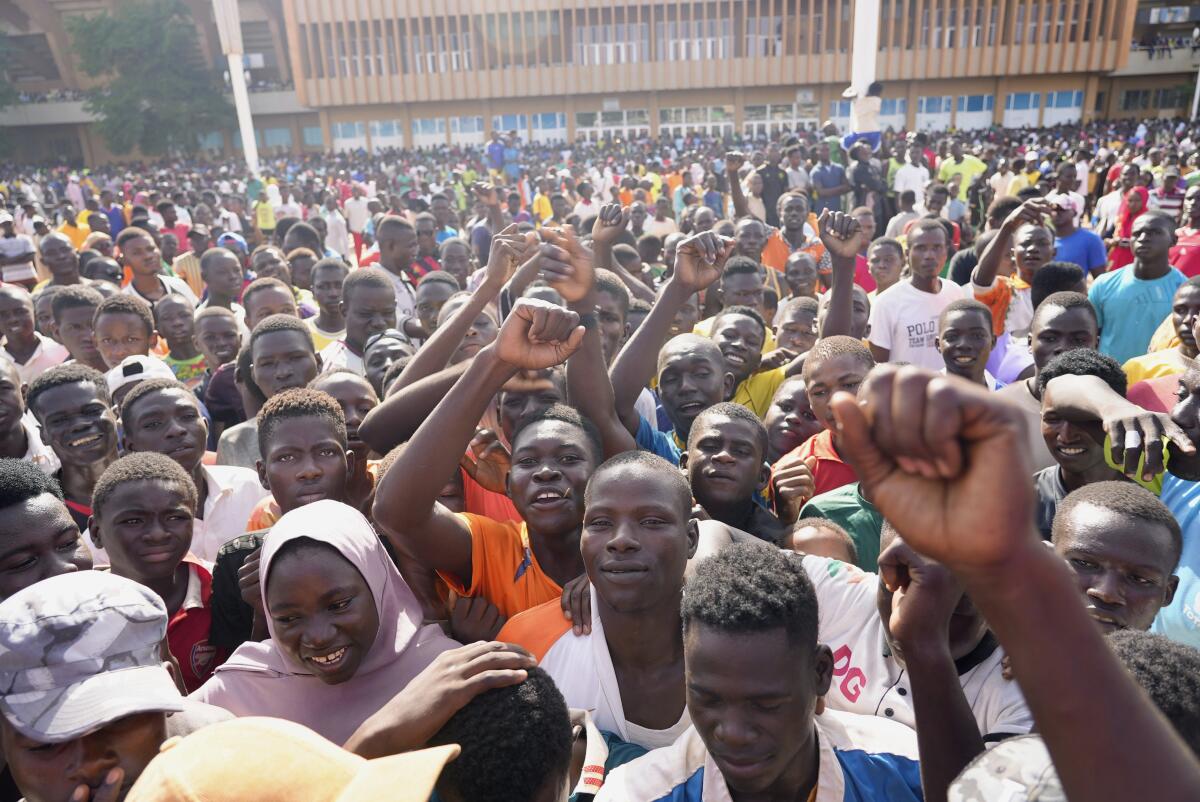
“You cannot carry out fundamental change without a certain amount of madness. In this case, it comes from nonconformity, the courage to turn your back on the old formulas, the courage to invent the future. It took the madmen of yesterday for us to be able to act with extreme clarity today. I want to be one of those madmen. We must dare to invent the future”.
– Thomas Sankara
History is a great teacher. If we do not learn from it, we are doomed to repeat mistakes made. Early post-colonial African leaders such as Kwame Nkrumah, Sekou Toure, Modibo Keita and Marien Ngouabi spoke of economic independence and the ongoing struggle for true independence. Well aware of the trap of bogus independence, what Walter Rodney referred to as “brief- case independence”, or what I refer to as “flag-and-anthem independence”, these leaders mobilised and organised their people for the completion of their respective national liberation struggles. However, Western imperialism and its stooges, or “running dogs of imperialism”, as the Chinese revolutionary leader, Mao Zedong called them, either overthrew or assassinated these visionaries. Like so many conquerors throughout history, the imperialists enlisted the support of reactionary regimes and Western assets in the military to achieve their diabolical agenda, that is to keep Africa in a state of permanent dependence and servitude, so they could continue their rape and plunder of the continent.
Frantz Fanon’s observation in his seminal work, ‘Towards the African Revolution’ remains as relevant today as it was when it was first published in 1964. Fanon observed that “the great success of the enemies of Africa is to have compromised the African themselves. It is true that these Africans were directly interested in the murder of Lumumba, Chiefs of puppet governments, in the midst of a puppet independence, facing day after day the wholesale opposition of their peoples, it did not take them long to convince themselves that the real independence of the Congo would put them personally in danger”.
Fast forward to 2023, and as if to confirm his status as a compromised African, ECOWAS Chairman, Nigeria’s President Bola Tinubu, is expressing his concern that the emerging trend of coups in West Africa had reached “alarming levels”. Of course, alarming for him as he wonders if he will be the next neo-colonial leader to be swept aside.
As a multipolar world emerges, all over Africa the people are rising up and challenging decades of neocolonial rule, exploitation and fake independence, favouring relations with Russia and China over the US and West Europe. Regardless of what takes place at the political level, it is when the masses rise up that real and meaningful transformation occurs. It is the masses who make history. They are just waiting for the moment, for the tipping point and the moment is here.
In Africa, here in the Caribbean and South America, and throughout the Global South, people at the grassroots are often clearer about what is taking place globally than many who are located in the ivory towers of academia, who so often become confused. In the poorest areas of Guyana, people who have never travelled far from their area or had access to books, or even in some cases internet, are very clear about why Muammar Qaddafi was killed, while we had the globally renowned Guyanese economist and dependency theorist, Clive Thomas, regurgitating the imperialist narrative “Qaddafi must go!” For the masses, knowledge is not gleaned from books and other people’s stories and therefore it is not disembodied. Knowledge devoid of an experiential dimension becomes an abstraction and this precludes an authentic understanding of the immense pain suffered by the peoples of the Global South, and the devastating impact that the injustice we experience has on every aspect of our lives, including whether we and our loved ones even get to live.
Thus, the only people who truly understand the suffering that inflicts millions on this earth every day are the sufferers themselves. As we say in Guyana, “who feels it, knows it”. Those who have been forced to reckon with it, and to fight it themselves, are the ones who will eventually make the change. These are the people who filled the stadium on August 7th to support the revolutionaries of Niger as they closed Niger’s airspace and refused to surrender. These are the people who are signing up in their thousands to defend Niger as I write this article. These are the people in Nigeria and Ghana who oppose their country’s proposed military intervention in Niger because they understand all too clearly that this is a proxy war hatched by the imperialists, especially the US and France. These are the ones in Haiti, who understand and support Jimmy Chérizier, while Haitian activists residing in the US and France and commenting from their ivory towers are falling for the Western narrative which insists on criminalizing those from the Haitian streets who have become conscientized, and now, instead of fighting each other, are fighting their oppressors.
“When the people stand up, imperialism trembles”.
– Thomas Sankara
The political heirs of the traitors who stood in the way of the post-colonial revolutionary African leaders are now plotting and planning ways to thwart and kill this new generation of African revolutionary leaders, Ibrahim Traore of Burkina Faso, Assimi Goita of Mali, and Abdourahmane Tiani of Niger, all in the name of ‘democracy’ – liberal democracy, a Western colonial imposition, an illusion of democracy, a trap that has left the African continent in chaos, persistent poverty and chronic dependency – the hallmarks of the neo-colonial arrangement. It is the chains of this enslavement that the revolutionary coup leaders in Burkina Faso, Mali and Niger are determined to break. The same chains that Imran Khan is determined to break in Pakistan.
 General Abdourahamane Tchiani, Niger
General Abdourahamane Tchiani, Niger
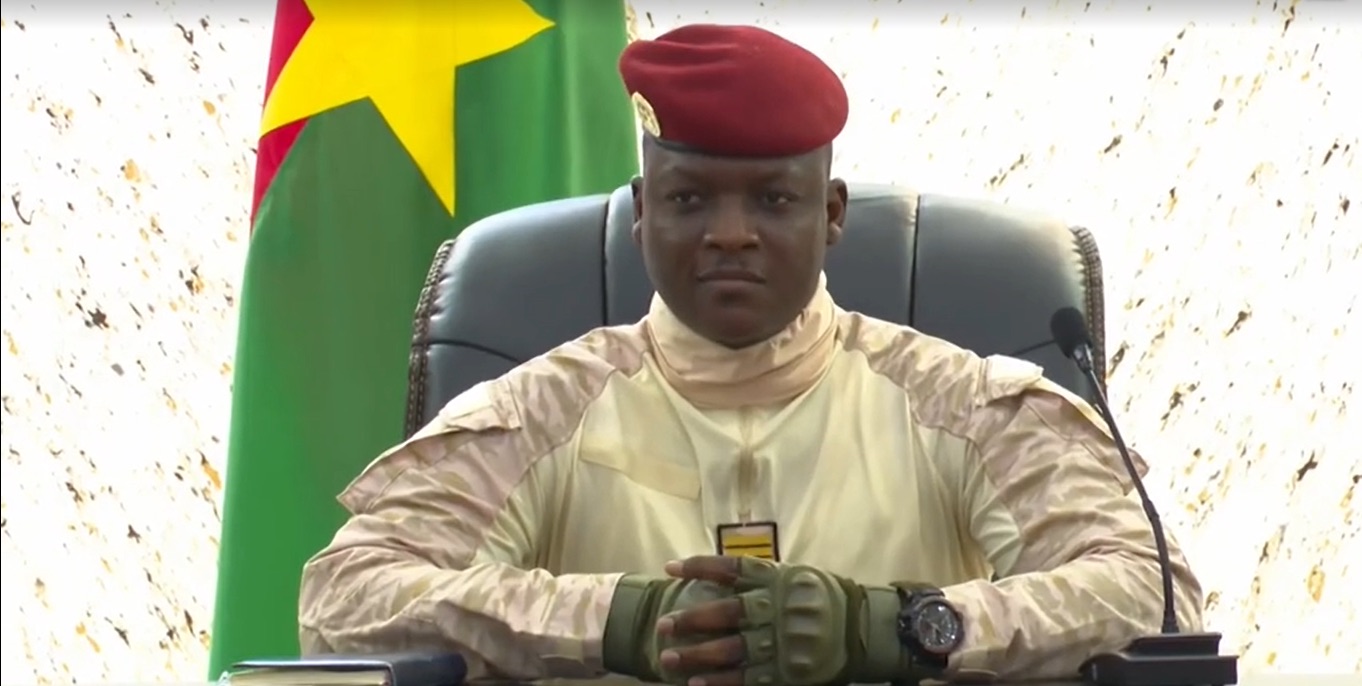 Captain Ibrahim Traoré, Burkina Faso
Captain Ibrahim Traoré, Burkina Faso
 Colonel Assimi Goita, Mali
Colonel Assimi Goita, Mali
“Imperialism is a system of exploitation that occurs not only in the brutal form of those who come with guns to conquer territory. Imperialism often occurs in more subtle forms, a loan, food aid, blackmail. We are fighting this system that allows a handful of men on earth to rule all of humanity”.
– Thomas Sankara
In the words of Kwame Nkrumah: “Neo-colonialism is not a sign of imperialism’s strength but rather of its last hideous gasp”. The Empire knows that it has come to the end of its reign, even if they refuse to admit it openly. The power and influence of the Empire is fading faster than could have ever been imagined even a year ago, it is indeed taking its last hideous gasp. Although in the open, the US and West Europe are still strutting on the world stage with their usual arrogance and bravado, behind closed doors they are in panic mode.
This new set of compromised Africans, under the umbrella of ECOWAS (Economic Community of West African States), continue to push for a military intervention in Niger, backed of course by France and the US, but as I write, are still retreating from making that fatal mistake as they realize it would be doomed to failure. The Western Corporate media continues to bleat about restoring ‘democracy’ to Niger, despite the fact that the coup leaders have the overwhelming support of the people – isn’t that democracy? BBC repeats the same thing over and over, that the US and EU are committed to finding a diplomatic solution to Niger’s “political turmoil”, despite the fact that there is no turmoil as the people of Niger express their overwhelming support for the coup. It is the imperialists that are in turmoil as they realize the extent of the support the coup leaders and Russia have, and the extent of the hatred that is being directed towards them.
 The people make history – coup supporters in the streets of Niger, “Down with France, Long Live Putin”
The people make history – coup supporters in the streets of Niger, “Down with France, Long Live Putin”
ECOWAS is a neo-colonial body that colludes with the imperialists to keep the existing political and economic arrangement intact. It’s the Black face of White supremacy. Obviously, the coup leaders of Burkina Faso, Mali and Niger are well aware of this. All three countries are members of ECOWAS. However, unlike the pro-Western puppets they removed, these revolutionaries are determined to move beyond sham independence and bogus liberal democracy. Those useless neo-colonial States like Nigeria should pay attention to the suffering of their people, rather than talking about invasion. Where were these “running dogs of imperialism” when NATO was bombing Libya into dust. Truth be told, some of these cowards, who call themselves African leaders went along with the imposed decision to destroy Libya. The good news is that it is only a matter of time before they are swept away by the rising tide of the African Revolution.
Why did the ECOWAS proposed invasion, backed of course by the French and the US, not eventuate when the first deadline they imposed on Niger expired? The reason is that they realized then, and are realizing even more so now, that they would not only have to reckon with the military but also the people of Niger who have already had a taste of the dignity that comes with true independence and real sovereignty. In addition, these compromised Africans are afraid that their shameless and traitorous behaviour will be even further exposed than it already is, and that this will cause greater unrest in their own countries.
The Niger coup leaders took the courageous and imperative step of not only kicking out their French neo-colonial masters but have threatened sanctions, withholding the supply of precious raw materials such as gold and uranium. This has sent shock waves throughout the imperialist world. The withholding of uranium is especially terrifying for the French government since uranium from Niger in part powers French nuclear power plants. The French State is the major shareholder in the multi-national mining company Orano (formerly known as Areva), that has been mining uranium in Niger for almost 50 years. According to the World Nuclear Association (WNA), Niger is the world’s seventh-largest producer of uranium and has Africa’s highest-grade uranium ores. Although Orano has already depleted some mines, they are determined to remain in the country, having set their sights on Niger’s Imouraren mine. Listed as the one of the world’s largest uranium deposits, Orano refer to it on their website as “Imouraren Project, the mine of the future”.
Despite this wealth of resources, Niger remains one of the poorest countries in the world, which tells you everything you need to know about France’s ill-gotten gains. In France, one out of every three light bulbs is lit thanks to Nigerien uranium, while in Niger, nearly 90% of the population has no access to electricity. Is this the democracy they want to restore in Niger?
To operate the fifty-six nuclear reactors in France’s eighteen power plants, an average of approximately 8,000 tons of uranium is required every year. This uranium comes mainly from three countries: Kazakhstan (27%), Niger (20%), and Uzbekistan (19%). Although Niger only accounts for 5% of global production, well behind Kazakhstan (43%), Canada (15%), Namibia (11%), and Australia (10%), and even though France could manage without Niger’s uranium, it is the precedent that Niger is setting that is most alarming for France and the entire Western world. Not since Muammar Qaddafi nationalised Libya’s oil companies in 1973, leading to a global oil supply crisis that resulted in desperate measures including carless days in major Western cities, have the imperialists been so afraid. As Francois Mitterrand boldly admitted in 1957, “Without Africa, France will have no history in the 21st century”.
Africa is the world’s true superpower
As I have written in previous articles, there is nothing that the US and Western Europe fears more than a united Africa that is free and independent, and whose resources can no longer be extracted in an exploitative manner. We must never forget that the Western world’s development was possible as a result of hundreds of years of the free labour of captured and enslaved Africans, and the plunder of African resources since the onset of the colonial project right up to the present day. They know that a united and independent Africa would completely alter the balance of power globally. It is a well-documented fact that if Africa stopped the flow of all raw materials to the Western nations for just one week, these nations would grind to a halt.
In 2007, in Conakry Guinea, Qaddafi made a simple observation to a cheering crowd of thousands: “Whenever I ask people about Pepsi-Cola and Coca-Cola people immediately say it’s an American or European drink. This is not true. The kola is African. They have taken the cheap raw material from us, they’ve made it into a drink, and they sell it back to us for a high price. We should be producing it ourselves and selling it to them.”
This is exactly the point that the revolutionary leader, Ibrahim Traoré is making as he implements projects to increase the manufacturing and processing of raw materials in Burkina Faso. This is of course a fundamental step in the struggle to free any country from persistent poverty and dependence. You can only achieve economic freedom and prosperity for your people when you halt the export of raw materials and start to produce the final product locally.
At this critical juncture in history, Africa is finally realizing its immense power. These times represent a new opportunity because global events are transforming the balance of power and China and Russia are backing Africa’s attempt to take its rightful place on the world stage. This is a moment we cannot afford to miss or to be robbed of. Realizing our power is primarily a psychological transition, it is quite simply a matter of liberating ourselves from our mental incarceration. Almost every known natural resource needed to run the contemporary industrial/high tech economies—such as uranium, gold, copper, cobalt, coltan (for cell phones, video games, laptops), platinum, diamonds, bauxite, and especially large reserves of oil are located in Africa. Azania (South Africa) alone contains half the world’s gold reserves. Democratic Republic of Congo contains half of the world’s cobalt and 80% of the world’s known coltan reserves. One quarter of the world’s aluminum ore is found in the coastal belt of West Africa and the continent is awash in petroleum reserves.
A defining moment for Africa and Africans all over the world, we are getting a glimpse of the kind of power that Africa possesses. Ibrahim Traore, Assimi Goita and Abdourahmane Tiani embody the ideas of Garvey, Nkrumah, Sankara, Qaddafi and every great African freedom fighter who envisioned an Africa free from the bondage of colonialism, neo-colonialism and imperialism.
We must rally to support them as they face the age-old imperialist arsenal of weapons. The usual all-out campaign to demonise them has already been launched, their entire psych-ops will be based on a sophisticated program of deception. If that fails, which it will, given the current awareness worldwide that the emperor is indeed naked for all to see, the next move will be military intervention, using the neo-colonial satraps amongst us, such as President Tinubu of Nigeria, just as they have done in the past.
Compromised Africans come in many guises. Bola Tinubu is an obvious case, openly working in tandem with the imperialists and therefore easy to spot. However, I have seen many who should know better getting excited over the speeches of African leaders who remain conceptually incarcerated, and therefore also compromised, such as President William Ruto of Kenya. He is a good orator and his speeches are full of promise, much the same as Barak Obama’s speeches were. In fact, the vision of a free and independent Africa articulated recently by President Ruto sounded nothing short of revolutionary. I don’t wish to be a pessimist, but a good talker is one thing and decisive action is another, and sadly, there are so many contradictions with regard to President Ruto that I know he inevitably falls into the first category.
President Ruto is calling for a new financial arrangement but says nothing about dismantling the neo-liberal capitalist arrangement that the present financial model is based on. Why? Because the ideology that his center-right party, the United Democratic Alliance adheres to is neo-liberal capitalism. He wants to have a fair financial arrangement within an unfair arrangement. Totally impossible. He uses the word ‘Afrocentric’ but I’m certain he uses it as a substitute for ‘African’ rather than as an ideological concept. He is calling for betterment for our African homeland within a system that colonised and enslaved our ancestors and is still ravaging Africa to this day. This same system got rid of the leaders I mentioned above and frustrated every attempt they made to bring about a new and just economic and financial order. And it is the defenders and enforcers of this same system that are lining up against the revolutionary leaders in Mali, Burkina Faso and Niger. Herein lies the contradiction that renders his speeches nothing more than empty rhetoric.
Time for ‘us’ to put sanctions on ‘them’
It is time for Africa to finally rid itself of the last vestiges of colonialism and neo-colonialism. If we have to stop the flow of strategic resources to the Western capitals until they comply with our demands for self-determination, then so be it. It is time for us to apply sanctions on those Western capitals that refuse to respect our God-given rights. The way in which Western sanctions against Russia have completely backfired, resulting in an economically stronger Russia and an isolated West, now teetering on economic collapse, has shown the world that the pendulum has already swung. Western hegemony is over.
Africa has never been in a better position to finally take its place at the global table as an equal partner and demand prosperity for its people. The Worldwide Pan-African Movement and the African masses are crying out for this – the time is now. Africans everywhere must exert maximum pressure on their leaders to realize this power; we owe this much to all those who have gone before us, who have fought and died to realize this dream. Those African leaders who cannot get on board must be moved out of the way. An ECOWAS invasion of Niger must not be tolerated.
The global shift that is happening before our eyes is not a recent phenomenon, it has been building up for decades. The US and Western Europe have been in panic mode behind closed doors for a very long time. They thought that bombarding the world with anti-Russia and anti-China propaganda would work, but it has failed dismally, and much to their dismay, African youth are taking to the streets in greater and greater numbers waving Russian flags. The experience of the people throughout the Global South, especially in Africa, has of course run contrary to Western propaganda. Having experienced centuries of exploitation and genocidal policies by the West, they have never forgotten the fact that both Russia and China, who never had colonies in Africa or anywhere in the Global South for that matter, assisted them in their struggles to free themselves from Western domination and Apartheid in South Africa.
In an article that appeared in the Financial Times as far back as 2007, authors W. Wallis and G. Dyer, wrote: “Western powers real concern is that African States will opt for Chinese deals to free themselves from the punitive conditions of IMF/ World Bank loans and other forms of financial dependence on Europe and the Unites States. As the second largest source of oil in Africa, Angola is now in such a strong position that it is rejecting IMF loans completely. As one consultant put it, with all their oil revenue, they don’t need the IMF or the World Bank. They can play the Chinese off against the Americans.”
In another article titled, ‘China and USA in New Cold War over Africa’s Oil Riches. Darfur? It’s the Oil, Stupid…’ author William Engdahl points out: “Today China draws an estimated 30% of its crude oil from Africa. That explains an extraordinary series of diplomatic initiatives which have left Washington furious. China is using no-strings-attached dollar credits to gain access to Africa’s vast raw material wealth, leaving Washington’s typical control game via the World Bank and IMF out in the cold. Who needs the painful medicine of the IMF when China gives easy terms and builds roads and schools to boot? What does all this mean for Africa? Quite simply it means that we now have a choice in trading partners, and although all trading partners drive a hard bargain – some are giving better deals than others and in addition, respect our right to self-determination.
Black Power – African Power!
This is the moment to put all our efforts into the realization of Nkrumah and Qaddafi’s grand plan for a United States of Africa. As I write, I am heartened by news that Algeria has refused France’s request to use its airspace for a military operation in Niger. Algerian President Abdelmadjid Tebboune stated that “a military intervention could ignite the whole Sahel region and Algeria will not use force with its neighbours”. Only when we can achieve this level of unity and power, will we be able to take our rightful place in the world. At last, we will be able to engage with the rest of the world on our own terms and in our own interest. Backed by a population of 1 billion people, Africa will then be able to make demands that cannot be ignored.
In 2009, at a meeting of the AU in Addis Ababa, Qaddafi, commenting on West European and US attitudes to Africa, and had this to say: “If they do not want to live with us fairly, then they should know it is our planet and they can go to another planet.”
Fair and just is all we are seeking – only the unfair and unjust have anything to fear.
Imperialism can only be buried in Africa…
In an article in 2011, I invoked as its title Sekou Toure’s bold assertion: that imperialism will be buried in Africa. To Western commentators this might have seemed optimistic, and indeed some commentators asserted that it was not grounded in reality and that we were, if anything, being crushed by imperialism’s might. However, looking at it from a revolutionary Pan-African perspective one simply sees it as inevitable. Imperialism can only be defeated in Africa. Although there is a revolutionary fightback globally, and most notably throughout Central and South America, it is only when Africa is free that imperialism can finally be buried, since it is Africa that fuels the imperialist’s existence and their space age.
The onus is on revolutionary Pan-African organizations/movements, on the continent and in the Diaspora, to provide clear analysis and strategies capable of thwarting the enemies’ plans at every point. We must rid ourselves of the evil scourge of US and West European imperialism, their created, funded and facilitated so-called ‘jihadists’ (aka NATO’s foot soldiers) and the confusion and havoc they are spreading, and their neo-colonial regimes. There is no room or time for indecision leading to inaction. We must bury imperialism in Africa once and for all or we will surely perish.
Following the destruction of the Libyan Jamahiriya and the assassination of Muammar Qaddafi, veteran African freedom fighter and former president of Namibia, Sam Nujoma, was extremely critical of the African Union’s weakness, stating that they “had woefully failed to mobilize militarily to stop the bombing of Libya and that the African Union should have mobilized their forces in order to fight and defend the territorial integrity of Libya”. He offered the following advice: “Africans should talk war – the language best understood by Western countries…The imperialists understand no other words than fighting. We dislodged them from our continent by fighting them. If we did not fight in Namibia or in Zimbabwe or elsewhere, we would not be free today. We must now prepare to fight them again…”Certainly, the courageous revolutionaries of Mali, Burkina Faso and Niger have heeded his call and are leading the way. We salute them and pledge our support on every front. It was no coincidence that the All African People’s Revolutionary Party (AAPRP) theme for African Liberation Day, 2023, was “Smash Neo-colonialism, African People are Ready for Revolution”.
I end with the immortal words of Kwame Nkrumah:
“We have awakened. We will not sleep anymore. Today, from now on, there is a new African in the world”.
Gerald A. Perreira is a writer, educator, theologian and political activist. He is chairperson of Organization for the Victory of the People (OVP) https://www.ovpguyana.org/ based in Guyana and an executive member of the Caribbean Pan African Network (CPAN). He lived in the Libyan Jamahiriya for many years and was a founding member of the World Mathaba, based in Tripoli, Libya. He can be reached at mojadi94@gmail.com .
https://libya360.wordpress.com/2023/08/24/mali-burkina-faso-and-niger-at-the-forefront-of-the-african-revolution/

The recent assassination of the U.S. puppet President Jovenel Moise in Haiti and the counter-revolutionary activity in Cuba has a familiar smell. A rot, a stench that fouls the air. It is the reeking of U.S. imperialism. While details of the assassination are still unfolding, it’s well documented that the U.S. has a history of documented interference in both nations. These imperialist actions in Cuba and Haiti are part of an ongoing U.S. aggression in the region.
Haiti
The recently assassinated Haitian president Jovenel Moïse, like his predecessor Michael Martelly, came to power through the selection, financing, diplomatic backing, and violent force of the U.S. government. And like a long line of presidents who were forced on the people of Haiti by the United States, Moïse was never accepted by the people of Haiti who want the freedom to choose their own leaders and determine their own destiny. President Moïse a was a “puppet” leader who ruled Haiti at the behest of the United States. And while the U.S. press focuses repeatedly on Haiti’s poverty, they fail to tell the inform the public of Haiti’s wealth. We are not told that Haiti has an abundance of natural resources, including gold, oil, and most importantly iridium, a rare mineral necessary for satellites and spaceships. Haiti also provides cheap source of labor of the United States and other foreign capitalists, as well as fertile agricultural land which farmers are being violently forced off. Whether Moise’s death was a result of in fighting between the ruling class in Haiti or a direct hit orchestrated by the U.S. deep state, the results are the same. Moise was the target of the recent people’s uprisings in Haiti. He made enemies everywhere; disbanding the parliament and attempting to change the constitution, constitutional changes that would have benefited Moise’s ability to continue his rule. But like uprisings against Mubarak in Egypt popular uprisings are a threat to stability and often turn so called U.S. allies into liabilities. This is likely the case of President Moise. Let us be clear this statement is based on the U.S.’s historic role in Haiti, the region and what crimes imperialist have made and intend to make in Haiti. The U.S. refused to recognize Haiti’s independence in 1804. The U.S. invaded, looted and occupied Haiti from 1915-1934. The U.S. deposed and then kidnapped the only popular democratically elected president Jean-Bertrand Aristide twice in 1991 and 2004 because he dared to raise the minimum wage and attempted to use the Haitian mineral wealth and land for the Haitian people.
Billions of dollars collected for the people in the name of the devasting 2010 earthquake that killed 200,000 or more, were stolen under the watch of former U.S. President Clinton. The United Nations Stabilization Mission in Haiti (MINUSTAH) did little to protect the masses of the people in Haiti. Some MINUSTAH forces, exploited and raped women, and youth of all genders. MINUSTAH where often used to protect neo-colonial interest and suppress the forces of Haitian resistance. We stand with the Black Alliance for Peace’s statement on no intervention in Haiti.

The United States has a long history of attempting to control Cuba, and the Cuban people have a long history of resistance. In 1959 Cuba fought for and won its independence becoming a free nation. Increasingly obsessed with overthrowing the newly independent Cuban nation, the U.S immediately launched an unrelenting series of covert operations aimed at forcing Cuba to return to U.S. domination. Presently, in its effort to strangle Cuba and overthrow its legitimate government, the U.S. authorized a program of covert actions against Cuba. Millions of dollars are continually poured into Cuba to create and fund anti-government, counter-revolutionary forces. Masking as “promoting democracy, the U.S. biggest weapon is the illegal blockade and sanctions, which have resulted in extreme shortages of food, medicine, fuel, and other necessities. The COVID-19 pandemic eliminated tourism on which Cuba depends heavily for revenue. Consequently, the Cuban people faced shortages, and many have expressed their frustration through protests. These so-called pro-democracy forces are easily detectable because they are the ones running around with U.S. flags chanting U.S. slogans. The clandestine forces portending to be left but talking right are far more dangerous. They often are supported by CIA propaganda post that pop-up over-night transforming them to international celebrities. A barrage of tweets from fake hashtags all repeating the same message have been found to emanate from robotic sources in the United States. This propaganda boosted by imperialist forces makes it appear that masses of people are in Cuba are in rebellion. They are repeated and repeated by capitalist corporate news sources; the New York Times, CNN, Fox, then by fake and so-called left publications who insist these forces are left of the Cuban Communist Party pick-up the stories. This is the old playbook used by imperialist to influence public opinion through fake news ran by imperialist intelligence agencies but more sophisticated today complete with blogs, tweets and their own left publications. There is nothing in the corporate news about the thousands and thousands of Cubans in the streets in support of the Cuban government. This does not fit the imperialist profile of a country about to fall. The U.S.’s brutal blockade has starved the people of Cuba for more than six decades, robbing Cuba of hundreds of billions in much needed resources. Yet Cuba’s international solidarity has grown. In the middle of a pandemic that has left people around the world in crisis both financially and medically Cuba produces 5 Covid-19 vaccines. With unbridled courage they face their economic challenges with dignity and resolve. What we don’t see in the US press is thousands of Cubans who took to the streets to defend their sovereignty, their dignity, their freedom, and their revolutionary process. The All-African People’s Revolutionary Party stands with them.
We reject all forms of U.S. intervention in Cuba. We condemn the illegal blockade and all attempts to overthrow Cuba’s revolution. We unconditionally support the Cuban People and the Cuban Revolution.
VENCEREMOS!!
https://www.theinsightnewsonline.com/cuba-and-haiti-the-stench-of-u-s-imperialism/

U.S. and other foreign interventions are the cause of Haiti’s ongoing crises.
The first calls for foreign intervention into Haiti came soon after the assassination of Haitian President Jovenel Moïse in Port-au-Prince on July 7th. Intervention was justified by the claim that Moïse’s death had created a vacuum of political leadership and authority that would push Haiti into a maelstrom of chaos and anarchy — into what the Guardian announced as a “violent new era.” Only intervention, led by the US and supported by its international partners, could save the troubled republic from an inevitable crisis.
By all accounts, the press projections of Haiti falling to barbarism after the assassination has not happened. But the calls for foreign intervention have continued. These calls have ignored two important and consequential facts. First, previous foriegn interventions have been unmitigated disasters. They have led to long-term military occupations that destroyed the Haitian state and marginalized civil society while leaving tens of thousands of Haitians displaced or dead. Second, and most importantly, Haiti is already under occupation. Calls for “intervention” are not only disingenuous, but actually redundant.
The first US intervention and occupation of Haiti officially began with an echo of the present. In 1915, Haitian president Theodore Guillame Sam was murdered – dragged out of the French legation and killed in the streets – after he had imprisoned and then killed a number of his political opponents. Fearing political chaos, and with a desire to protect US interests, persons, and property, the US landed three hundred troops on July 28th, 1915, initiating a military occupation that lasted nineteen years, until 1934.
But the calls for intervention and the strategies for occupation had long preceded Sam’s murder. In the years leading up to the landing of US marines in 1915, the National City Bank of New York was becoming increasingly involved in Haiti’s financial affairs. They pushed for control of Haiti’s railroads, ports, the national bank, and the sovereign debt – and they were encouraged by the US State Department, who had adopted the well-known policy of “dollar diplomacy” throughout the Caribbean region . Bank managers served as shadow representatives of the State Department in Haiti.
CIty Bank officials had already called for US military intervention to protect their Haitian investments before 1914. In 1914, bank vice president Roger Leslie Farnham wrote a memorandum outlining a strategy for occupation, saturated with racial paternalism and ideas of Haitian inferiority, for US secretary of state William Jennings Bryan. The same year, City Bank officials sent a request for US Marines to land in Haiti to move the $500,000 gold reserve from the Banque National d’Haiti in Port-au-Prince to a Wall Street vault. They asserted the action was taken to protect their investments. Haiti’s politicians viewed it as theft, and a deliberate attack on the Republic’s sovereignty.
When intervention and occupation did occur in 1915, the bank consolidated its near-monopoly control of Haiti’s finances, banking, and industry. During the first occupation, the US rewrote the Haitian constitution and installed a puppet president, imposed press censorship and martial law, and brought Jim Crow policies and forced labor to the island. It also initiated a “pacification” campaign against those Haitian militants engaged in armed struggle to protect the republic’s sovereignty. The US military dropped bombs and burned villages, tortured and murdered peasants, and hunted rebel “bandits” for sport.
Of the stated aims of the occupation – building infrastructure, expanding education, and providing internal and regional stability – little was achieved. The longstanding result of the US occupation was the establishment and training of a local police force, the Gendarmerie d’Haïti. Years after the occupation, this police force was used to terrorize the Haitian people.
US troops withdrew in 1934 after a sustained period of protest, begun in 1929 by Haitian students and eventually joined by all classes of Haitians and Haitian allies in the international community.
The US would continue to intervene Haitian affairs, first supporting the brutal dictatorship of Francois “Papa Doc” Duvalier and Jean-Claude “Baby Doc” Duvalier, and then again in 1991 as the CIA bankrolled a coup d’etat against the country’s first democratically elect president, Jean-Bertrand Aristide. The coup was not consolidated because of continuous resistance from the Haitian people. By 1994, US president Bill Clinton’s administration was forced to bring Aristide back to Haiti after 3 years in exile, with 20,000 troops brought in to quell Haitian resistance. But Aristide was now a hostage to US neoliberal policy. The US troops remained until 1999.
The second occupation of Haiti began in 2004 and was initiated after a coup d’etat sponsored by the U.S., France, and Canada that dethroned elected Haitian president Jean-Bertrand Aristide. Aristide was kidnapped by US marines and sent to the Central African Republic. US President George W. Bush announced afterwards that he was sending US forces to Haiti to “help stabilize the country.” It is clear, as Glen Ford and Peter Gamble remind us, “George Bush didn’t invent U.S. aggression against Haiti; that’s been U.S. policy since 1804.”
The 2004 illegal coup d’état was both enforced and cleaned up with the sanction of the UN. The UN took over from US forces and established the United Nations Stabilization Mission in Haiti (or MINUSTAH) for the tasks of military occupation under the guise of establishing peace and security.
A multi-billion dollar operation, MINUSTAH had, at any given time, between 6000 and 12,000 military troops and police stationed in Haiti alongside thousands of civilian personnel. Like the first US occupation, the UN occupation under MINUSTAH was marked by its brutality towards Haitian people. Civilians were brutally attacked and assassinated. “Peace-keepers” committed sexual crimes. UN soldiers dumped human waste into rivers used for drinking water, unleashing a cholera epidemic that killed between 10,000 and 50,000 people.
The Core Group — an international coalition of self-proclaimed non-Black “friends” of Haiti — emerged through the MINUSTAH occupation in 2004. Its stated goal was to oversee Haiti’s governance. Meanwhile, as with the first occupation, the US and MINUSTAH trained Haitian police forces, reintegrating many of the rogue members into these forces. The US, in collusion with MINUSTAH and the Core Group, also over-rode Haitian democracy, installing both neo-Duvalierist Michel Martelly and his PHTK party, alongside Martelly’s protege and successor, Jovenel Moïse. Moreover, it was under occupation that Haiti was devastated by the 2010 earthquake; all the pledges of humanitarian aid and assistance and the promises to “build back better” have amounted to nothing, the funds grifted by the Haitian oligarchy and comprador bourgeoisie, as well the international community.
While it is claimed that this occupation officially ended in 2017, with the dissolution of MINUSTAH, the UN has remained in Haiti through a new acronym: BINUH, the United Nations Integrated Office in Haiti. BINUH has had an outsized role in Haitian internal political affairs. For example, soon after Moïse was killed, its representative, Helen La Lime, asserted that Claude Joseph would be installed as Haiti’s leader. Later on, the “Core Group” switched gears and demanded that Ariel Henry should be president. And this is exactly what happened when a “new” Haitian government was announced on July 20, 2021, with Henry as leader. This without any say from the Haitian people.
It would seem that the goal, and perhaps success, of this occupation has been to not only permanently quell the last vestiges of the mass movement that emerged through the fall of the Duvalier dictatorship and culminated in the 1990 election of Jean Bertrand Aristide. The objective was to also completely and fatally destroy the Haitian state. And with that, the turning of Haiti into a permanent vassal state. In this, the self-hating comprador bourgeoisie, the poodles for white supremacy, have played a significant role. It is noteworthy that, in the wake of Moïse’s assassination, the comprador bourgeois lapdogs (such as Claude Joseph, Joseph Lambert, Ariel Henry) as well as the nonBlack oligarchs (such as Reginal Boulos) rushed first to get the blessings of their white overlords, representatives of the UN occupation force, the Core Group and the U.S. State Department.
For Haiti, both the first occupation, in 1915, and the second, in 2004, were unmitigated disasters. Both were premised on the idea that not only was Haiti falling into chaos and anarchy, but with the deeply racist notion that Haitians are unable to govern themselves. Be it under watch of US Marines, a multinational UN force, or an international cohort of technocratic experts in security and democracy, it seems likely that the ongoing second occupation will be intensified by a formal foreign military intervention.
The occupation will only end with the complete withdrawal of the imperial powers from Haiti.
Peter James Hudson is a writer, editor, and historian who teaches Black Studies at UCLA. He is the author of Bankers and Empire: How Wall Street Colonized the Caribbean.
Jemima Pierre is a contributor to Black Agenda Report, the Haiti/Americas Coordinator for the Black Alliance for Peace, and a Black Studies and anthropology professor at UCLA.
https://www.theinsightnewsonline.com/haiti-on-interventions-and-occupations/

Niger’s military administration on Friday gave the German, US and Nigerian ambassadors 48 hours to leave the country.
“In reaction to German Ambassador Olivier Schnakenberg’s refusal to reply to an invitation by the ministry for a discussion on Friday August 25 at 11.00 a.m., and due to other actions of the German government contrary to Niger’s interests, the ministry … is giving 48 hours to Mr. Olivier Schnakenberg’s to leave the Nigerien territory,” according to a Foreign Ministry statement.
“In reaction to Nigerian Ambassador Mohamed Usman’s refusal to reply to an invitation by the ministry for a discussion on Friday August 25 at 11.30 a.m., and due to other actions of the Nigerian government contrary to Niger’s interests, the ministry … is giving 48 hours to Mr. Mohamed Usman’s to leave the Nigerien territory,” it said separately.
The military also gave the new US ambassador 48 hours to leave.
US Ambassador Kathleen Fitzgibbons, who arrived in the national capital of Niamey last week was accused of failing to honor an invitation by the ministry for a discussion earlier in the day.
The State Department said last week that FitzGibbon was to lead a US diplomatic mission and bolster efforts to help resolve the political crisis.
Niger’s military administration earlier gave the French ambassador 48 hours to leave the country.
French Foreign Minister Catherine Colonna sent an Aug. 8 note to express solidarity with Nigerien Ambassador in Paris Aichatou Boulama Kane who refused to leave her position after the military administration took power.
Niger was plunged into turmoil July 26 when Gen. Abdourahamane Tchiani, a former commander of the presidential guard, led a military intervention that ousted President Mohamed Bazoum. (Text, excluding headline: Anadolu Agency)
Source: News Express
Berhan Teklay: Developer of an E-learning Model
Mussie Efriem
On Aug 28, 2023
Our guest today, Mr. Berhan Teklay, is a developer of the Rural Education & E-learning Model, which allows students to remotely interact with their teacher, learn and submit their schoolwork using smartphones.
* * *
Please introduce yourself.
My name is Berhan Teklay. I studied mathematics, with minor in computer science and education, in college and am now working as an ICT teacher at Asmara’s Felege-Hiwet Elementary and Junior Secondary School. In the past, I also taught at Foro, Selae Daero, Massawa and Adi Halo.
Tell us about your product that was at the exhibition last week, at the Expo grounds in Asmara, on the occasion of Festival Eritrea.
I call it ‘Rural Education & E-learning Model 561’ and is related to my ICT career. It is a computer that runs on solar power and is designed to serve multiple purposes. At the moment it is essentially intended to be used as an ICT (computer) laboratory, a digital library, an audio-visual class, computer programming, robotics, and a staff computer.

My first priority is computer literacy. So, the most important thing I want to do first is teach the students the fundamentals of computers in order to familiarize them with the technology. In terms of utility, like any computer, the solar computer has Wi-Fi, which the kids use. The teacher could control all of the gadgets, and the students could submit their schoolwork and follow their teacher through over their smartphones that we are using as computers. According to my research, there is one smartphone for every two students in towns, and one smartphone for every three or four students in rural areas.
The local Wi-Fi covers a radius of 10-15 meters and multiple devices can be connected at the same time, which means the entire class joins the teacher, who is the admin of the group. While the teacher is giving a lesson, the students cannot access any other file without his permission. It means that the same computer screen appears on all devices, and the students can learn Microsoft Office and other computer basics through that. This way they are able to follow the teacher on their smartphones or tablets until he completes the lecture, after which he can allow them to complete their specific exercises by providing them a user name. Everything that can be done by personal computers can be done over smartphones. Aside from ICT, students can also learn all of the other academic subjects. But I want this to be only the beginning so that students can become familiar with the computer before they move on to the next level.
The main reason I started this was to save money, and I discovered that it is way too simple to install and make available to students. Especially for students in remote areas, where there is no electricity, it does miracle. What would normally take 300,000 Nakfa can be done with merely 1200 Nakfa. This means all schools, including those with minimal resources, can afford it, allowing every citizen to have access to a computer.
Where did you get the idea for this?
When we covered the ICT TEXT book twice in one semester in my class and were left with a whole semester to spend, my students requested that I teach them more practical classes and show them how to make computer programs. I started thinking about it and began showing my students through their Android phones. Later, we developed it into a digital library. Then I was interviewed by Isayas Oqbay, host of Eri-TV’s show, Tech-Insight. Once the interview was shown on TV, Rora Digital Library and Students Exploration and Discovery Center (SEDC) asked if I needed any assistance, and they gave me Raspberry Pi computers and asked me to produce something for the digital library.

What are the reactions of students and the general public?
The reactions are promising and plenty of questions are coming to me. Adults ask me about my typing skills. And, yes, the keyboard is on the screen, which means you’ll be writing in Microsoft and other programs just like you do in text messages on smartphones. Typing skills will not be useful here. In any case, the first thing I want to do is instill basic computer literacy in children who live in less accessible places. Smartphones and tablets are user-friendly, portable, and require less training, so they have benefits over computers. In fact, the younger generation is so familiar with smartphones that I’ve seen many kids type faster on the screen of a smartphone using their two fingers than people typing on the keyboards of their personal computers using all ten fingers. So, we need to chase technology, which, in my opinion, can solve many problems. Of course, students need supervision because leaving them unsupervised in the digital world is akin to abandoning them in the wild.
What’s the progress you have made so far?
I’ve already tested it in my class with my students, and it’s promising. I’m hoping it will help the students become acquainted with the digital world in their earlier grades. I spoke with some Ministry of Education officials, and they advised me to test it in villages and small towns as well. So, I am now preparing to do this at three villages, which is encouraging. I competed at the African Union’s educational innovation challenge in Tunisia, where, out of 960 proposals, mine was one of the 15 finalists.

What about the program’s other prospects, aside from the academy?
Of course, it has the potential to provide a wide range of other services. It can be applied in giving courses, at conferences, and could help in administration. Any public or private organization can utilize this solar personal computer at a low cost, and it can be used as a local network, as a message board instead of posting notice sheets, and it has many other business applications. In fact, I’ve been contacted by various public and private institutions requesting that I install this program for them. But for the time being, my focus is on academics because that was my initial goal, and then we can go on to other things.
Any final thoughts?
We can’t deny that the digital world is taking over every area of our lives, but the crucial question here is how to manage it for the benefit of society. The youthful generation, in particular, is very well acquainted with digital technology. Even if technology has negative aspects to it, we can’t completely deny kids using it. Instead, we must be vigilant and responsible in order to guide them in a way they could be productive. And I am planning to do my little part in that matter. Instead of relying on technology firms to manufacture for us, we can tailor what we need according to our preferences and way of life.
Ministry of Information Eritrea
https://shabait.com/2023/08/28/berhan-teklay-developer-of-an-e-learning-model/
Yemeni government officials have tortured, raped, and executed migrants and asylum seekers from the Horn of Africa in a detention center in the southern port city of Aden, Human Rights Watch said today. The authorities have denied asylum seekers an opportunity to seek refugee protection and deported migrants en masse to dangerous conditions at sea.
https://www.hrw.org/news/2018/04/17/yemen-detained-african-migrants-tortured-raped
Houthi forces in April 2020 forcibly expelled thousands of Ethiopian migrants from northern Yemen using Covid-19 as a pretext, killing dozens and forcing them to the Saudi border, Human Rights Watch said today. Saudi border guards then fired on the fleeing migrants, killing dozens more, while hundreds of survivors escaped to a mountainous border area.
https://www.hrw.org/news/2020/08/13/yemen-houthis-kill-expel-ethiopian-migrants
A deportation center in Riyadh is holding hundreds of mostly Ethiopian migrant workers in conditions so degrading that they amount to ill-treatment, Human Rights Watch said today. Detainees alleged to Human Rights Watch that they are held in extremely overcrowded rooms for extended periods, and that guards have tortured and beaten them with rubber-coated metal rods, leading to at least three allegations of deaths in custody between October and November.
https://www.hrw.org/news/2020/12/15/saudi-arabia-migrants-held-inhuman-degrading-conditions
According to new figures, the US dropped nearly three bombs every hour, 24 hours a day in 2016.
https://www.theguardian.com/commentisfree/2017/jan/09/america-dropped-26171-bombs-2016-obama-legacy
Today Libya is, alas, still a breeding ground for slavery. The migration crisis has multiplied opportunities for smugglers to reduce many migrants to the “status” of slaves. They are often kidnapped, physically abused by long working hours, but also sexually abused by traffickers of women and children. Unfortunately, this harsh reality has only gotten worse with the health crisis that the world has been experiencing for almost a year now.
https://www.growthinktank.org/en/the-return-of-slavery-in-libya/

